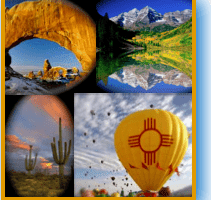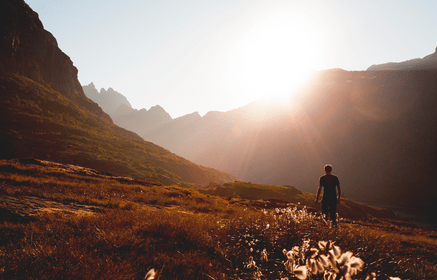Whether you are in the country or the city, learning how to stay safe is key to your mental and physical survival. In this post I focus on wilderness survival.

What would be your first instinct if you suddenly realized you’d lost the trail or somehow took a wrong route back to camp, it’s getting dark and you didn’t bring a flashlight? It can turn into a major ordeal for some people, but it doesn’t have to be.
Being lost isn’t the problem, it’s merely the situation. Staying calm and keeping a positive mental attitude is key. Your brain is your best survival tool, yet it can be your deadliest enemy. Survival is 80% mental, 10% skill and 10% equipment. The greatest challenge is usually the person against themselves. It has been reported that 87% of all people who become lost in the wilderness will panic and 50% will run until exhausted.
Fast breathing, tense muscles, butterflies in your stomach and feelings of helplessness may arise. However, you need to expect, recognize and accept the fact that this is a normal reaction. Surviving in the country or even in the city these days takes some finesse to not give in to any drama that may be happening around you. Remember to breathe deeply and slowly to accept the reality of your situation. However, if you find yourself lost in an outdoor wilderness situation, you might consider the following;
Retracing Your Steps
If you haven’t already, check yourself for any injuries. Then, think over past events to see if you can retrace your footsteps or travel pattern. Try and do this before dark. If you realize you will be unable to return to camp, or are uncertain of your location, commit yourself to spending the evening right where you are. Start thinking about signaling, be alert to any physical dangers and plan escape routes. If you are feeling a little insecure at all, hug a tree.
Adequate Shelter and a Fire is a Must!

Look around for the best campsite in the area, preferably close to an overhanging rock ledge or within a clump of trees that can provide protection from the wind.
Once you’ve found an adequate campsite, start looking for wood. If you’re already wet and cold, the fire will provide heat as well as light for signaling and companionship once darkness closes in. If the ground is dry, scrape down to the bare dirt to avoid starting a grass or forest fire. Also, be careful not to build a fire too close or under a tree for the same reason. Try to build the fire against rocks so that the heat will be radiated into the shelter, not blown into it.
Gather small twigs, wood shavings, bark, dead pine needles, dry leaves, grass or tissue paper for tinder. Place the tinder into a low pyramid to get the fire started. For the larger pieces, collect green wood because it will smoke, which is good for signaling. And always gather enough wood for the entire night. And while you are at it, create yourself a bed from pine needles, leaves or branches from trees at least eight inches thick to give you more insulation and comfort from the ground.
Remain Calm
It’s important to conserve and build up your resources from the beginning before greater emergencies overtake you. Staying active will keep you warm, even if you are shivering.
Shivering produces as much heat as running at a slow pace. Therefore, try to build the most secure and comfortable shelter you can, one that requires little maintenance once constructed. The importance of doing the job well while you are able to do it, cannot be over emphasized. Once the shelter is finished and you’re warming up by the fire, this is the time, understandably, that once again, fears may arise from the unknown; animals, darkness, society, discomfort or just being alone.
However, try to accept your situation. Your mind has the ability to analyze the problem and determine the success (life) or failure (death) of your survival situation. Meanwhile, if you were wearing a day pack, you could be rummaging through it looking for goodies to munch on as the fire warms you up.
Basics to Carry in Your Daypack at All Times- Don’t leave your pack anywhere but on your back because the weather can change!
* Map and compass – learn how to use them and orient yourself before leaving camp.
* Waterproof matches – carry in a waterproof case
* Whistle (plastic) – metal will stick to lips if outside temperatures are too cold
* Nylon cord
* Knife
* Extra food – granola bars, dried fruit, bagels, etc.
* Tube tent or garbage bags – for extra shelter and warmth
* Sunscreen and eye protection
* Flashlight – with extra batteries and/or candles
* Signal mirror
* First Aid kit – band aids, tape, compress bandage, etc.
* Extra clothing – socks, shirt, hat, waterproof jacket – lightweight and easy to layer.
Down-filled vests or parkas can be a blessing or a curse. Though they are light weight and easy to carry, when the temperature rises, perspiration creates dampness and matting, which causes the down to lose its insulating qualities. Headgear is essential because in the winter it can conserve heat and in the summer provide shade. The body radiates heat from the head and extremities. An uncovered head can lose up to one-half of the body’s total heat. The old saying, “If your feet are cold, put a hat on” is good advice.
In winter, gloves and mittens are also absolute necessities in conserving body heat as well as protection while gathering and cutting firewood. Without them, the body is in direct contact with many cold surfaces, such as snow, cold ground, rocks or water and therefore makes you chill faster. Furthermore, to lower the risk of hypothermia, always carry a raincoat, water repellent parka or poncho in your pack. Winter is the time to use extreme good judgment and carry adequate supplies while exploring the back country.
When Illness Strikes
Hypothermia
Hypothermia is the lowering of the body temperature and is nothing to fool around with. Stay alert to intense shivering, which are the first signs. If you are already wet, get that fire built fast and if possible, take off your wet clothes. Wet clothes lose body heat 27 times faster than dry ones. Violent shivering and sluggish thinking indicates the second stage. By the third stage, the shivering stops and the skin turns blue and puffy. Stumbling and erratic movement also occurs.
By this time, it’s a 50/50 chance of coming back alive. As the hypothermia advances into the fourth stage, vital signs are nil and the person may be unconscious or exhibit irregular heartbeat and respiration. If the situation has reached this point, death is highly probable. However, it’s within our power to sustain from this ever happening, unfortunately it can and does occur.
Water
If you are wandering around for more than a day, more than likely you’ll run out of water. I recommend trying to drink at least 3 quarts a day because dehydration can occur within hours, even in winter. However, a person can go several days without water in a cool climate, if they don’t exert themselves. Water can sometimes be found by digging in low, damp areas, especially if there is vegetation around. Watch animals and birds as they may lead you to water. Despite the fact, that there might be the risk of giardia in the water, it’s still better to bear the outcome of an upset stomach, than to die from dehydration. If you drink enough water, you can usually survive two or more weeks without food. However, you’ll be more alert, efficient and have more confidence if you’re able to satisfy your hunger.
Food
There are many sources of food, but it may be necessary to change your way of thinking to recognize them. Generally, anything that birds and animals eat will be safe and have some value.
Avoid game or fish that appears sick, lazy or acts strange. Become familiar with the plant food in your area such as nuts, berries, roots, grain, fruit, and even tree bark. If you’re not familiar with what is available, it might be better to avoid plants as food.
Ask Yourself Next Time You Venture Out
Can you survive in the wilderness by yourself with what you’re carrying in your pack?
Have you studied how to read a topographical (topo) map for directions?
Do you know how to use a compass?
Have you told someone where you am going, how many people are with you and when you plan to return?
Finally remember —> Nature is and can be a calming or a negative experience. It all lies in your mind. Being lost isn’t the problem, it’s merely the situation. You are in charge. Therefore, try to plan outings so you’ll be back before dark and keep an open mind.
“If you wake up in the morning, you have survived the night.”
You May Also Enjoy:
Discover 5 Exclusive Attractions on New Mexico’s Turquoise Trail
Soaking in Northern Arizona’s Verde Canyon Hot Mineral Springs

